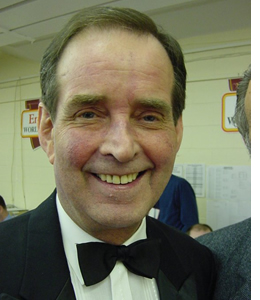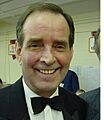John Spencer (snooker player) facts for kids

Script error: The function "getImageLegend" does not exist.
|
|
| Born | 18 September 1935 Radcliffe, Lancashire, England |
|---|---|
| Died | 11 July 2006 (aged 70) Bolton, Lancashire, England |
| Sport country | England |
| Professional | 1967–1992 |
| Highest ranking | 2 (1977/78) |
| Tournament wins | |
| Ranking | 1 |
| World Champion |
|
John Spencer (born 18 September 1935 – died 11 July 2006) was a famous English professional snooker player. He was one of the best players in the 1970s. He won the World Snooker Championship three times: in 1969, 1971, and 1977.
After his playing career, he worked as a commentator for the BBC. He was also a part of the World Professional Billiards and Snooker Association (WPBSA) for 25 years. This is the main group that runs the sport. He even led the group as chairman from 1990 to 1996.
Contents
Early Life and Starting Snooker
John Spencer was born in Radcliffe, England, on 18 September 1935. He was the youngest child in his family. He first played snooker on a homemade table. When he was 14, his dad showed him how to play on a full-sized table. By age 15, he made his first century break. A century break means scoring 100 points or more in one turn.
When he was 18, he joined the RAF for three years of National Service. After that, he didn't play snooker for over ten years. But at 29, an old friend got him back into the game.
He entered the English Amateur Championship in 1964 and finished second. The next year, he was second again. But in 1966, on his third try, he won the title! He beat Marcus Owen 11–5 in the final.
John married Margot Sawbridge in 1969. They separated later but remained good friends.
Becoming a Professional Snooker Player
Spencer became a professional snooker player in February 1967. He was the first British player to do so since 1951. He was encouraged because he could earn money playing in special matches. His amateur rivals, Gary Owen and Ray Reardon, also became professionals later that year.
Before 1969, the World Snooker Championship was decided by challenge matches. But in 1969, it became a knockout tournament again. This meant players were knocked out if they lost. Spencer was one of the new players in the tournament. He even had to take out a bank loan to pay the entry fee!
Spencer won the 1969 World Championship as a first-time player. He beat the defending champion, John Pulman, and then Rex Williams. In the final, he played against Gary Owen. The match was very exciting, with both players playing boldly. Spencer won the final 37–24, becoming the first World Champion of snooker's modern era. He won £1,780, which was a lot of money back then!
A snooker historian named Clive Everton said that Spencer's playing style was amazing. He was great at long shots and powerful shots. He brought a fresh, attacking style to the game.
Winning More World Titles
In the 1970 World Championship, Spencer lost in the semi-finals to Ray Reardon. Reardon went on to win the title.
But Spencer won his second world title in 1971. This championship was held in Sydney, Australia. He beat Ray Reardon in the semi-finals and then Warren Simpson 37–29 in the final. He was the first player to win the world title in a knockout event held outside the UK.
He reached the final again in 1972 but lost to Alex Higgins. This match was very important for snooker's popularity in Britain. The final was played in unusual conditions, with power shortages and reduced lighting. Higgins won 37–31. Spencer said Higgins played better and deserved the win. He also knew that Higgins's win helped snooker become even more popular.
Spencer won his third world title in 1977. This was the first time the championship was held at the Crucible Theatre in Sheffield, England. The tournament has been held there every year since. Spencer beat Cliff Thorburn 25–21 in the final.
He also won other important tournaments:
- The first ever Masters in 1975. He won the final against Ray Reardon on a re-spotted black. This means the black ball was placed back on the table for a tie-breaking shot.
- The first Irish Masters in 1978.
- Three times he won the BBC's Pot Black series.
In 1979, Spencer made history by being the first player to score a maximum break in a professional tournament. A maximum break is the highest possible score in one turn, which is 147 points. However, this break was not officially counted because the table's pockets had not been checked properly. Three years later, in 1982, Steve Davis made the first televised 147 break, and Spencer was his opponent watching!
Playing Style and Later Career
John Spencer was one of the first top players to use a two-piece cue. A cue is the stick used to hit the snooker balls. He was known for his unique way of hitting the ball and his amazing cue power. This meant he could hit the ball very hard and make it do special things, like spin backwards (a screw shot) or to the side (side spin). People said he had a bold, attacking style and was very confident.
Later in his career, Spencer faced health problems. He was diagnosed with a condition called myasthenia gravis in 1985. This condition affected his eyes, causing double vision. This made it very hard for him to play snooker well.
He made his last appearance at the World Championship in 1986. He lost to Alex Higgins in the first round. His last big achievement was reaching the quarter-finals of the 1987 British Open when he was 51 years old. He lost to Jimmy White.
Spencer retired from professional snooker in 1992 because of his health. But he still played in exhibition matches, which are friendly games. He also continued to serve as chairman of the WPBSA for four more years.
Life After Snooker
In 1973, Spencer wrote a book called Spencer on Snooker. It taught people how to play and shared his thoughts on other players.
After he stopped playing professionally, he became a snooker commentator for the BBC in 1978. He enjoyed this job for 19 years. He also opened two snooker clubs in Bolton.
In 2003, John Spencer was diagnosed with stomach cancer. He chose not to have chemotherapy so he could enjoy his remaining time without the side effects of treatment. He even did a sponsored parachute jump in 2005 to raise money for a charity related to his eye condition. His autobiography, Out of the Blue – Into the Black, was published that same year.
John Spencer passed away on 11 July 2006, at the age of 70, due to stomach cancer. In 2018, a trophy for the World Seniors Masters tournament was named the John Spencer Trophy in his honor.
Images for kids
 | Emma Amos |
 | Edward Mitchell Bannister |
 | Larry D. Alexander |
 | Ernie Barnes |


